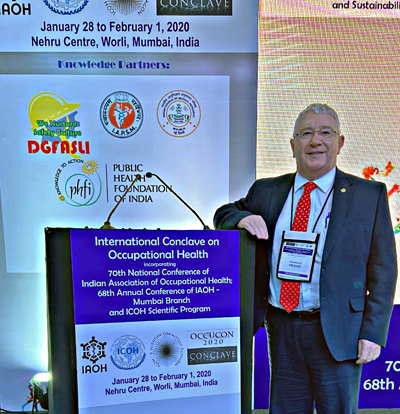From the CEO's desk: March 2020
 Photo: Garth Manning with friend and colleague Ramnik Parekh
Photo: Garth Manning with friend and colleague Ramnik Parekh
I recently had the honour of being invited to represent WONCA at an occupational health conference in Mumbai, India. I had been asked to deliver a plenary on how we might integrate Basic Occupational Health Services (BOHS) into primary care, and also took part in a panel discussion on the same issue.
Workers at greatest risk for work-related illness and injury may have little or no access to formal occupational health services, and it is estimated that less than 15% of workers actually have even basic access. However many of them – maybe 80% or more - may be eligible for care in primary care centres. So how can we use PHC as a tool to providing better BOHS??

Work is an important social determinant of health, and work characterized by low job security, high hazards, poverty wages, and limited labour rights contributes to health disparities. Global restructuring of work relationships over the last several decades has increased economic migration; temporary, contingent and precarious employment; and wage stagnation.
Low-wage workers are often in high-hazard industries such as construction, agriculture, fishing and manufacturing – often referred to as the three Ds or
Dirty, Difficult or Dangerous. These workers frequently face additional challenges associated with poverty and immigration, and fear of job loss may be compounded by the fear of deportation.
Occupational illness and injury carry long-term consequences for affected individuals and their families, as well as direct and indirect costs that exceed those even for cancer. However, occupational health is often neglected in medical education and in primary care and specialty practice, despite the evidence that workplace exposures contribute to the development of chronic diseases, such as asthma, or complicate the management of other diseases, such as diabetes.
The late, great Professor Ian McWhinney used to remind us that “The family doctor is committed to the person rather than to a particular body of knowledge, group of diseases, or special technique”. And in our endeavour to provide comprehensive care we must always consider our patient in the context not just of the home and the community, but we must also consider the workplace, where a great deal of illness can be generated or exacerbated.
But there are inevitably many barriers and constraints to providing BOHS within PHC. Occupational illness and injuries may occur infrequently, and may be perceived as being difficult and time consuming. Doctors and nurses feel that they lack sufficient training and information, and they may have a limited relationship with the local occupational support services. Health professionals will also lack understanding of the legal issues surrounding occupational health. And of course there is the question of who might pay for the provision of these additional services.
As family doctors providing whole person care we cannot ignore occupational health as a significant part of our care of the patient. So we need to be better informed and educated on the topic. But we also need to encourage our patients to take more responsibility for their health and well-being. Primary care providers have a responsibility for all health-related aspects of personal life but to achieve this we need to build the capacities of primary care centres to respond effectively to the general and specific health needs and expectations of working populations and we need to Link occupational health services and primary care centers under local primary health care networks.

We need more help, through training programmes and courses and CME sessions to better sensitise family doctors to occupational health issues. And we need more useful reference materials such as a book, co-edited by my very dear friend Ramnik Parekh, “BOHS for formal Industry: a manual for primary care providers”. As our then President, Professor Michael Kidd, said in the foreword to this publication: "Those of us working in primary care have a responsibility to provide the basic occupational health services needed by our individual patients and our communities in each country of the world."
In 2014 WONCA and ICOH (International Commission on Occupational Health) got together to make a pledge to the patients we serve. In this pledge we said:
"WONCA and ICOH pledge to work with our partner organizations (including WHO and ILO) to address the gaps in services, research and policies for the health and safety of workers and to better integrate occupational health in the primary care setting, to the benefit of all workers and their families”
We continue to subscribe to that pledge and will continue to work together – and with other agencies – to try to ensure the best health care, and the best occupational health care – that we can.
In this, of course, we are greatly assisted with expert advice from our Special Interest Group (SIG) on Workers Health, ably chaired by Professor Ezequiel Lopez of Argentina. Anyone with an interest in Workers Health is strongly encouraged to join this group, details of which can be found on the WONCA website
here.
Garth Manning
CEO